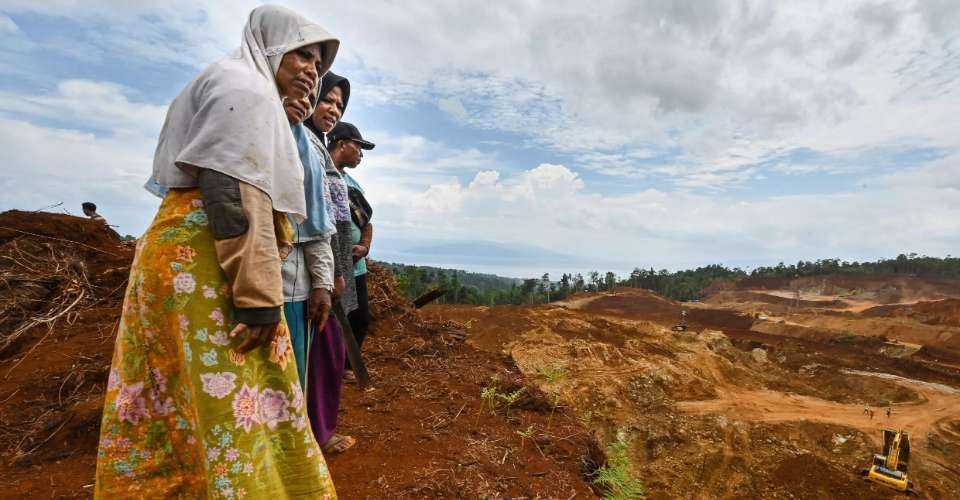
Villagers stand on their family land as they watch a nickel mining operation on Wawonii Island, Indonesia. (Photo: Adek Berry/AFP)
Indonesian bishops have rejected to accept mining permits offered to religious groups by the administration of outgoing President Joko Widodo, said a top official of the Catholic Bishops’ Conference (KWI).
The conference has “no interest in taking up the offer,” said Father Marthen Jenarut, executive secretary of the bishops’ Commission for Justice and Peace, Migrants and Itinerant People.
While other religious groups are willing to take the offer, the Catholic Church maintains its stance to remain committed to “encouraging sustainable development management,” Jenarut said.
“Economic growth must not sacrifice people’s lives and environmental sustainability,” he said in a statement obtained by UCA News.
He said the conference’s role is only related to the apostolic duties of service, proclamation, liturgy and martyria, rather than other issues such as managing mining.
Jenarut added that the conference “always upholds the principle of caution so that all actions and decisions taken do not conflict with the principles of the Catholic Church's service which upholds human dignity, justice, solidarity, subsidiarity, common good, and maintains the integrity of creation."
He also urged Catholic organizations to "obey the principles of spirituality and social teachings of the Catholic Church in all their actions."
The statement came after Cardinal Ignatius Suharyo Hardjoatmodjo of Jakarta said that the bishops were not competent in the mining sector and therefore rejected the government's offer.
"I don't know about other mass organizations, but in KWI we will not use that opportunity because it is not our territory to look for mines," Suharyo told reporters on June 5.
Meanwhile, the head of a Catholic religious organization told UCA News that the government's move was actually good "because religious organizations also need to strengthen their organizations with business."
"We do not accept it yet because we are not ready, but we are still considering it if we can one day," he said.
"If we are not ready, we could hand over the permit to mining entrepreneurs and this will only cause problems," he added.
Widodo signed a decree on May 30 opening the path for religious groups to manage concessions to "improve social welfare."
Leading environmental watchdog Mining Advocacy Network slammed the regulation as the government's attempt to keep and control natural resources for the benefit of elites, AFP reported.
The group’s national coordinator alleged the move is “a gratitude from Jokowi to religious groups for supporting him during his two terms" who seeks to maintain his political influence.
Several other religious organizations have expressed their readiness to welcome the regulation.
Indonesia's largest Muslim organization, Nahdlatul Ulama, which has more than 95 million members, said it was up for the task.
"Nahdlatul Ulama is ready with our skilled human resources, complete organizational structure, and strong business network," its chairman, Yahya Cholil Staquf said on June 3 in a post on their website.
Reverend Gomar Gultom, chairman of the Union of Churches in Indonesia (PGI) said respecting the decision of religious institutions that will take advantage of the opportunities offered by the government.
"But regarding PGI itself, we do not have an official attitude. We are actually being assigned to study this because it is still overcome with a variety of controversies. Really outside the mandate owned by PGI," he told UCA News.
In addition, he said, so far PGI has actively accompanied victims of development policies, including mining victims.
"Participating in a potential mining business will make PGI very vulnerable to losing moral legitimacy," he said.
Responding to the KWI's rejection, Minister of Investment, Bahlil Dahlia said on June 7: "I respect the views of those who may not be interested."
"We will provide an explanation," he said, adding that "differences are something that must be separated in order to reach the path of goodness."


